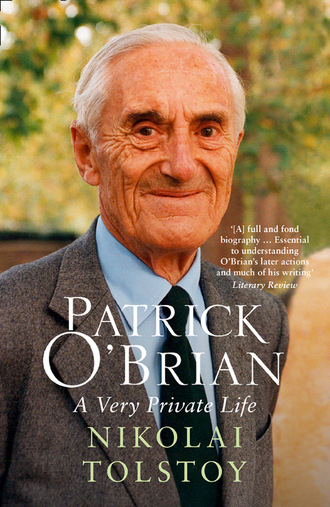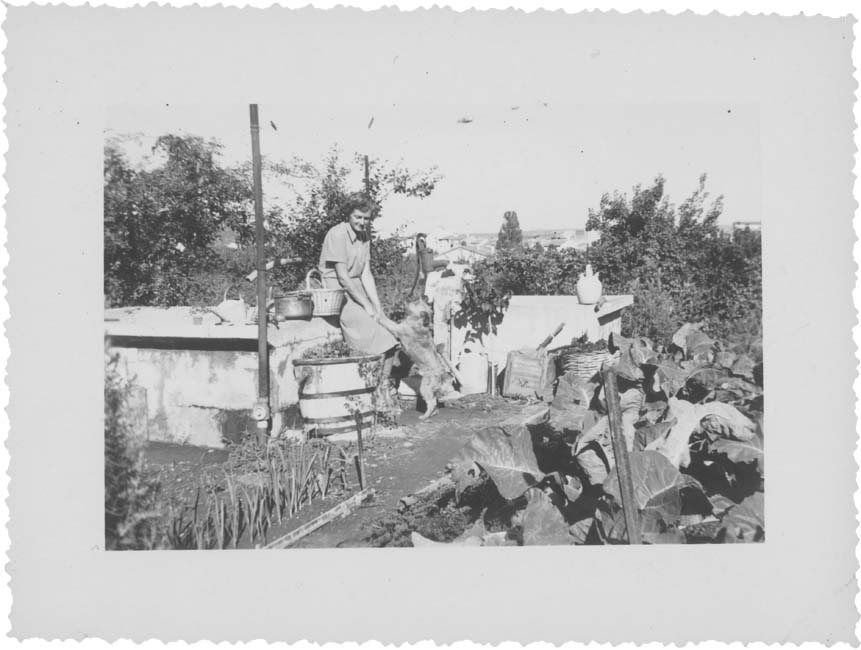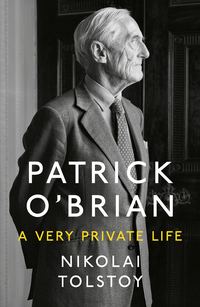
Полная версия
Patrick O’Brian
Apart from benefiting from the strip of land to make the family self-sufficient in fruit, vegetables, wine and honey, their plan was to construct a small stone chamber beside the road at the top of the vineyard, where Patrick could write in peace, away from the hurly-burly of the rue Arago. Such cells, known as casots, are scattered about the nearby hillsides, being used by cultivators of vignobles to store their tools and provide shelter from the burning sun during breaks from cultivation.
In order to accomplish this, it was first necessary to excavate a recess at the top of the rocky slope, which could only be accomplished by means of explosives. After obtaining the requisite permit, Patrick bought a quantity of dynamite and detonators. These being required to be kept separate, the dynamite was kept under Richard’s bed. In later life Patrick proved less circumspect. Nearly half a century later, not long after his death, I looked into the high shelf of a cupboard in the narrow passage next to the bedroom where my mother and Patrick slept. There I discovered a brown paper parcel which proved to contain two sticks of dynamite together with a detonator.
No wiser than Patrick, I assumed they posed no danger, since their explosive power must surely have long ago dissipated. Some years later I recounted my discovery to an old school friend, a retired Army officer. He impressed on me that the explosive was undoubtedly more dangerous, having become unstable after the space of half a century. This alarmed me, and it was arranged for it to be removed and exploded by the gendarmerie. I still feel qualms when I think of my parents blithely sleeping for decades with their heads three or four yards from a package capable of blowing up the entire house.
Returning to 1955, Patrick and Richard travelled beyond Port-Vendres to Paulilles, where they purchased the explosives. Unfortunately they missed the return train, and trudged the weary miles home, each carrying a 10-kilogram load. Next, holes were prepared with pickaxes and sledgehammers, and faggots gathered to restrict the effect of explosions, after which mining began.
Patrick was convinced he could handle the detonations himself, until a massive explosion discharged a load of rock perilously close to him and Richard. Henceforward he grudgingly employed a pair of burly Catalan miners, Cardonnet and his friend Juan, who completed the work with professional skill. This was the limit of assistance required, and the family’s daily toil is recapitulated in detail in Patrick’s gardening diary he kept that year. Mining completed, there succeeded the arduous labour of shifting stones out of the recess created. Although he and my mother worked themselves to the bone, the satisfaction at finding themselves at long last working their own land was boundless.

My mother with Buddug at the well
The work continued throughout July, when thundery weather made the heat all but unbearable: ‘we drip and pour,’ recorded my mother: ‘I plunged naked into the basin [by the well] yesterday after stone-shifting.’
Patrick was anxious to keep bees, as he had done successfully in Wales. By June the first hive was installed, and before long they were enjoying their own honey. Over the years complaints arose from inhabitants of the Faubourg below that they were persistently being stung. When suspicion turned to the outskirts of the town, Patrick shifted the hives out of sight onto the flat roof of the house. To a policeman calling to enquire whether they kept bees, he blithely denied the fact. However, this arrangement proving inconvenient as well as risky, in 1965 the hives were reinstalled by arrangement with a neighbour in a vineyard at the foot of the ridge of the Saint Elme above the house.
Eventually, the sad moment came when Richard had to depart. On 29 June he took the train to Paris, whence he sent back cheerful postcards. He left behind farewell presents of sweets and cigarettes, took with him a basket of presents for my mother’s parents in Chelsea, and posted parcels to her small nieces and nephew.
Save for the disastrous weeks in Cornwall, which had dampened the spirits of all three, there is every indication that Richard had enjoyed a particularly happy time throughout his long stay. Acquisition of the vineyard provided rewarding occupation, while his correspondence course kept his thoughts almost as busy as they had been with pretty Susan Hodder-Williams. Back in England, he successfully sat the examination at Cardinal Vaughan School. A month later, he wrote to say that he had joined the Royal Navy.
Richard’s departure left a tincture of sadness over the little household. Clearly, his service in the Navy would allow him small opportunity to return to Collioure during the two-year spell. Such leave as he would obtain was most likely to be spent with his mother in Chelsea. What neither they nor Richard anticipated was that he would never return. As will be seen in the next chapter, this was not in consequence of any specific decision, but arose from a constant lack of funds, together with Richard’s determination to forge a way for himself in the world. Patrick had good reason to be proud of him, but much distress lay in the offing.
A few weeks later Richard had settled contentedly into the service, enjoying the company of his comrades, and nurturing a fresh ambition to become a Fleet Air Arm pilot. Never a frequent letter writer (like many young men), he found himself so preoccupied that his correspondence grew more and more sporadic.
Meanwhile, having for the present lost a ‘son’ to whom she was devoted, my mother was about to resume relations with her real son, whom she had last encountered as a small boy at her parents’ home on the North Devon coast.
Throughout my schooldays there had been no communication between us, save my mother’s abortive attempt to resume contact on my sixteenth birthday. After leaving Wellington College in the summer of 1953, I enrolled in the Army as a regular soldier. After completing basic training in the Buffs (my local regiment) at Canterbury, I entered the Royal Military Academy at Sandhurst. By then I had developed an increasingly painful back ailment, which caused me to be invalided out of the Army in the spring of 1954. In June my mother sent me out of the blue a cheque for my nineteenth birthday, and we began exchanging letters.
In August of the following year she invited me to stay at Collioure. My stepmother had never disguised her dislike for me, and my father rarely showed me any affection. The time had come when I resolved to see the mother of whom I retained a bare half-dozen infant memories. That month I joined my father and stepmother for a typically strained holiday in northern Spain, and from there I journeyed at a leisurely rate in Spanish trains to Port Bou on the French Mediterranean frontier, and thence up the coast the three stops to Collioure. It being impossible to predict the precise time of my arrival, my mother remained on tenterhooks for two days. On the 29th she received ‘Letter from N., apparently woken up to the foolishness of going back to England before coming here, so he will reach Irun at 8 pm tomorrow en route for Collioure. I called on O[dette]., told her … Called on Tante & Marinette & told them: how they stared.’
Two days later: ‘Met trains all day, home beautifully neat under usual strain, but no Nikolai.’ Finally, on 1 September, I arrived at Collioure and made my way to the rue Arago. I climbed the steep staircase, knocked on the door, and there was my mother. I vividly recall Patrick standing a little behind, in that characteristic attitude which was to become so familiar, smiling with his head a little on one side and hands clasped before him.
My own emotions were confused, my mother being for me effectively a stranger, of whom I retained only the most fleeting of images. However, in consequence of my unhappy relationship with my father and stepmother, I found it exhilarating to find myself at home with contrastedly interesting and affectionate parents. My mother was understandably in raptures:
I had taught [her pupil] André his English, & P & I were sitting at tea when there was a knock, & it was N. Actually I am writing this on the 12th, being too excited before to write. I did not know how wonderful it would be to have N. again – Lord, Lord, I am so happy with P. & him, and so thankful. I would that R. were here too: he wrote to say that he is an Ordinary Seaman in the R.N., sounding very happy.
With hindsight, I fancy the visit might have gone better had Richard indeed been there, providing companionship of my own age. For the first fortnight all went well. My youthful enthusiasm for history overlapped closely – perhaps too closely – with Patrick’s own tastes. I browsed contentedly among his eclectic collection of books, which stood ranged against the wall in boxes he had carefully constructed to house them. We were a stone’s throw from the beach, and there was much to excite my passion for the Middle Ages in the ancient town. We travelled by bus to explore Andorra, still a wholly unspoilt medieval principality in the mountains.
By the time of my arrival, the walls and roof of the casot were all but completed. Like Richard, I assisted in my turn with the labours, my more modest contribution being attested to this day by a cement buttress beside the door bearing my initials. It was an exciting time for all, and my mother wrote exultantly: ‘We already plan next storey.’ (I am, incidentally, baffled by a writer’s claim that Patrick ‘built the hut by hand, something that O’Brian ironically would be ashamed of and very touchy about in later life when he became more established’. In reality, he was immensely proud of the fact that he had contributed so much of the labour, to which he regularly drew visitors’ attention when they called throughout the years that followed.)
I learned much about Patrick’s writing, and remember being particularly delighted by his good-humoured short story ‘The Virtuous Peleg’. His other writings were less to my adolescent taste, which was disinclined to stray beyond current obsessive enthusiasms. Unfortunately, those of his own works which would have appealed to me at the time remained inaccessible, since no copies of his early books published under the name Richard Patrick Russ were to be found in the house. Equally, the robustly exciting boys’ books The Road to Samarcand and The Golden Ocean had yet to be published.
It is hard for me now to be certain how far my faded image of those memorable three weeks remains entirely accurate. However, I do recall that after a week or so I began to find Patrick increasingly didactic and irritable, to an extent which swiftly became all but intolerable. Referring to himself on one occasion as ‘a writer who has been compared with Dostoevsky’ (which may conceivably have been true), he was openly contemptuous of my preferred reading: old-fashioned favourites such as Harrison Ainsworth, Charles Lever and R.D. Blackmore. Oddly enough, so far as I am aware Patrick had not read the one ‘good’ writer whose works I also loved – Walter Scott.[fn9] However, he possessed the 1839 ten-volume edition of J.G. Lockhart’s classic biography of his father-in-law, which on discovering my enthusiasm he presented to me during my stay. Glancing at it now, I suffer once again an acute pang of nostalgia, fancying myself back in the snug little flat at 39, rue Arago.
Today I remain shamefully conscious of the fact that the growing coldness which developed between us during my stay was very far from being Patrick’s sole responsibility, as I then believed it to be. I still recall with painful embarrassment how prone I was at the time to faults not uncommon among young men of twenty. Uncompromising political views, assertions of belief as incontrovertible fact, and related failings made me no more tolerable to my elders than many another immature youth awkwardly poised between adolescence and manhood.
On 13 September my parents’ old friend and colleague from their wartime service with Political Warfare Executive, the American academic Jack Christopher, came to stay. Lodgings were found for him with the Azémas, while he spent each day with us. A tall, mild-mannered scholar, he was co-author of a recently published two-volume History of Civilization. I recall Patrick’s humorously condemning the work, on the grounds that it omitted to mention a battle between the O’Tooles and the Danes – a joke repeated from a passage in The Golden Ocean, which he had just completed. While Jack was a model of discretion and politeness, Patrick at times used his presence to ‘punish’ me in a manner he not seldom employed when irritated, deliberately excluding me from conversations, in the course of which he occasionally let fall none too subtle allusions to my deficiencies.
Recollection of this first visit still pains me. Indeed, I was for long inclined to accept almost the entirety of blame for the mutual ill-feeling which increasingly pervaded my stay, until many years later I came to read my mother’s diary account of my visit: ‘N. left on 19th: when it started going bad I do not remember. Only I do remember being in the middle of it & trying & trying to think of something to bring things back to pleasantness.’
As her normal reaction to any such awkwardness was to support Patrick, right or wrong, I am inclined to infer that she sensed the faults were not all on one side. Long afterwards, I was told by their friend Mary Burkett that Patrick angrily declared on my departure that he would never allow me in the house again! This was the only such occasion of which I am aware when my mother put her foot down, insisting she would continue to see me regardless.
Fortunately the unpleasantness blew over, and the letter I wrote back after my return reads as though all had been warmth and light. Over the decades to come, I confess that Patrick and I continued at times to find each other difficult, or even downright insufferable. But each in his own way was, I believe, conscious that blame lay not all on one side, and such unpleasant clashes were invariably overcome and dismissed – lessening considerably, too, as the years passed by. However, there is no escaping the certainty that, had I not been my mother’s son, I would never have been invited to Collioure again.
Конец ознакомительного фрагмента.
Текст предоставлен ООО «ЛитРес».
Прочитайте эту книгу целиком, купив полную легальную версию на ЛитРес.
Безопасно оплатить книгу можно банковской картой Visa, MasterCard, Maestro, со счета мобильного телефона, с платежного терминала, в салоне МТС или Связной, через PayPal, WebMoney, Яндекс.Деньги, QIWI Кошелек, бонусными картами или другим удобным Вам способом.


